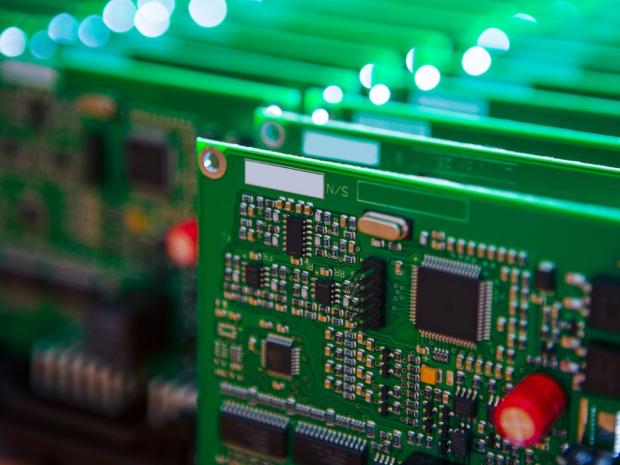- Academics
Electrical Engineering, B.S.

From the subway systems beneath our cities to the HD televisions on our walls to the smart phones in our pockets, innovations by electrical engineers touch every aspect of modern life. But this process of innovation is never complete, and new challenges await the electrical engineers of tomorrow.
As a student in our BS in Electrical Engineering program, you train to become a member of this next generation. Our curriculum builds on foundational mathematics and science courses with studies of analysis and design in electrical engineering. These studies often include hands-on coursework in our state-of-the-art laboratories. In addition, the variety of specialized subjects you can investigate through elective coursework — from local area networks to wireless communication and deregulated power systems — ensures a highly flexible education suited to your particular interests. Our BS in Electrical Engineering is accredited by the Engineering Accreditation Commission of ABET.
Recognizing the need for well-rounded engineers, we also emphasize strong communication and interpersonal skills. Our students develop these skills not only through required courses in the humanities and social sciences but also during team projects in design classes. Sponsored research and affiliate programs put you in a position to learn from faculty familiar with current issues.
Where possible, classroom work will challenge you to apply your knowledge to current design situations. You’ll also apply broad technical knowledge to practical problems through interdepartmental cooperation.
You can apply your electrical engineering training across a wide spectrum of fields. Our students have launched careers in electronic design, bioengineering, city planning, and astronautics. They also find opportunities in image processing, telemetry, computer design, and patent law. As they mature and develop their capabilities, their careers may move toward system engineering, management, sales, or education. Some graduates also pursue advanced studies toward a master’s or doctorate degree.
About the Program
The broad objectives of the Electrical Engineering Program are:
- Graduates are expected to be engaged and advancing in their professional careers in a profession that utilizes their NYU Tandon degree, in Electrical Engineering or other career path, that include industry, academia, and governmental or non-governmental organizations.
- Graduates are expected to be seeking continuous professional development and life-long learning through graduate school studies, continuing education credits and/or professional registration.
Student Outcomes
In order to prepare our students to meet these objectives after graduation the ECE department has adopted the ABET 1 to 7 criteria as the appropriate student outcomes that our curriculum is designed to foster in our students:
(1) an ability to identify, formulate, and solve complex engineering problems by applying principles of engineering, science, and mathematics
(2) an ability to apply engineering design to produce solutions that meet specified needs with consideration of public health, safety, and welfare, as well as global, cultural, social, environmental, and economic factors
(3) an ability to communicate effectively with a range of audiences
(4) an ability to recognize ethical and professional responsibilities in engineering situations and make informed judgments, which must consider the impact of engineering solutions in global, economic, environmental, and societal contexts
(5) an ability to function effectively on a team whose members together provide leadership, create a collaborative and inclusive environment, establish goals, plan tasks, and meet objectives
(6) an ability to develop and conduct appropriate experimentation, analyze and interpret data, and use engineering judgment to draw conclusions
(7) an ability to acquire and apply new knowledge as needed, using appropriate learning strategies
Minor in Electrical Engineering
You may obtain a minor in electrical engineering by taking 15 credits of ECE prefixed courses. The courses may be any ECE courses subject only to the prerequisite requirements. A grade of C- or better is required in ECE-UY 2004 and a GPA of 2.0 or better in the entire minor is required. A minimum of 8 credits in the minor must be taken at the School of Engineering. The electrical engineering minor is not open to computer engineering students.
More information is available in the NYU Bulletin.
Transfer Students
Transfer credits for courses taken at other schools are based on evaluation of content and level. Students completing the same program at another school, but in different years, may receive a different number of transfer credits. You should consult an electrical engineering undergraduate adviser for current information.
Curriculum
To fulfill the degree requirements for a Bachelor of Science in Electrical Engineering, you must complete 128 credits with at least a 2.0 GPA in all courses.
Senior Design Project
In the 2-semester Senior Design Project, a required course for seniors, you will focus on an aspect of electrical engineering. In the first semester, you will develop skills using specialized laboratory equipment and computer-design packages. You will be introduced to techniques for planning projects and how to make effective presentations. You will also learn to balance such design requirements as performance, safety, reliability, and cost effectiveness.
In the final semester, you will design, build, or simulate and test a device or system to meet prescribed engineering specifications. Informal and formal written and public oral presentations will help you prepare for professional careers. Design project students frequently work in groups or pairs to develop interaction skills essential to good engineering.
Senior Thesis
Seniors with a 3.0 GPA or above may register for Senior Thesis in place of the Senior Design Project. The thesis must be design oriented. If you opt to complete a Senior Thesis, you do not need to register for either DP-1 or DP-2 but must instead:
- Complete 6 total credits of ECE-UY 397. We recommend that these credits be taken over the course of 2 semesters;
- Make a presentation to your thesis adviser that is open for other students and faculty to attend; and
- Bind your thesis according to the School of Engineering's guidelines for MS and Ph.D. theses.
Before registering for Senior Thesis, you must arrange for a faculty member to serve as thesis adviser. Students in the Honors Program must complete a Senior Thesis, unless they have completed a MS thesis as part of their participation in the BS/MS Program. In such cases, the MS Thesis fulfills the requirement instead.
This program is registered with the New York State Education Department and, as such, satisfies the educational requirements in support of professional engineering licensure and/or certification in New York State, as well as the current educational requirements for licensure and/or certification in essentially all 50 States, the District of Columbia, Puerto Rico, and the U.S. Virgin Islands. While ABET accreditation satisfies the education requirement in essentially every U.S. jurisdiction, each state board still sets its own rules for experience, examination (FE/PE), and any additional requirements (e.g., ethics exam, references). For more information on Professional Licensure, visit the NYU Tandon and/or NYU websites.




